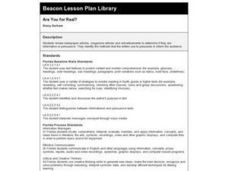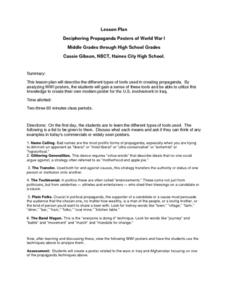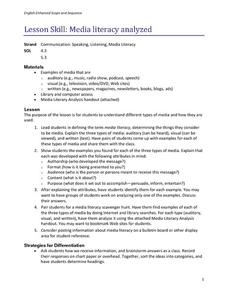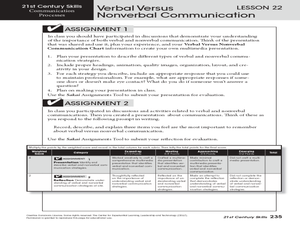Curated OER
Government: The Power of Persuasion
Learners are able to define and identify a type of interest group. They are able to describe some strategies used by interest group. Students are able to identify the postive and negative aspects of interest groups.
Curated OER
Biomes
Seventh graders research about the climate and weather in different biome types. In this biology lesson, 7th graders create a brochure of their chosen biome using Microsoft Publisher. They present their work in class.
Have Fun Teaching
Identifying Author's Purpose
The multi-lesson, 47-page packet contains everything you need to ensure kids can recognize the clues provided to identify the type of text, the intended audience, and the author's purpose in writing the passage.
Curated OER
Persuade Me
Seventh graders give persuasive presentations based on the questions they have researched. They examine appropriate delivery techniques for effective persuasive presentations. (Note: This lesson should be taught, after students have...
Curated OER
Are You For Real?
Students try to find newspaper and magazine articles that are informative or persuasive. They practice determining the differences between the two types of articles. They identify the devices authors use to persuade the audience.
Curated OER
The Art of Persuasion
Students practice persuasive writing by creating a travel brochure. In this creative writing lesson, students research a popular tourist destination they would like to visit and create a brochure enticing readers to come. Students...
Curated OER
SAVE OUR EARTH
Students research current environmental problems in order to develop and deliver an oral presentation. The presentation persuades the audience to act on the student's point of view on the issue.
Curated OER
Creating War Propaganda
Young scholars analyze propaganda techniques using posters, speeches, and other examples of this type of persuasion. They use this information to design their own examples of propaganda. They focus on propaganda techniques used during war.
Curated OER
Analytical Essay
What is an analytical essay? Introduce this type of thinking to your young writers. First, discuss what it means to analyze something. Then, identify the different components of an essay and what details are embedded in each component....
Curated OER
Persuasive Speech in Julius Caesar
After reading Julius Caesar 1.2 and 1.3, break your class into pairs for this role-play. Each pair will receive one of four prompts (or more, if you create additional examples), in which one person tries to persuade the other to do...
ReadWriteThink
Dear Librarian: Writing a Persuasive Letter
Everyone deserves to read a great book! Here, pupils write a persuasive letter to the school's librarian detailing their favorite story and why it should be found on the shelves. Class members' persuasive reading passages are shared with...
Curated OER
Deciphering Propaganda Posters of World War I
What strategies are employed when creating propaganda? Your young historians will learn about six different techniques utilized in the construction of political propaganda, particularly in the advertisements of World War I. The...
Curated OER
Media Literacy Analyzed
Fourth and fifth graders define the term media literacy, then come up with examples that they share with the class. The types of media studied are auditory, visual, and written. Learners get together in pairs and perform a media...
Curated OER
The Bill of Rights: Debating the Amendments
Provide your class with an opportunity to investigate an important historical document. Without identifying the document, distribute copies of the original Bill of Rights, as transcribed by John Beckley, Clerk of the House of...
Curated OER
Verbal Versus Nonverbal Communication
Young scholars create a multimedia presentation. They will complete a verbal versus non-verbal communication chart to create a multimedia presentation which will include the different types of communication strategies. Then answer a...
Curated OER
Speaking and Listening
What a terrific presentation! It takes learners through a step-by-step explanation to create a new type of chocolate bar, advertise the product, and design a presentation. This is a creative way to get your class writing and thinking...
Curated OER
Maniac Magee: A 5th Grade Literature Guide
There's no need to run around trying to plan a unit for the book Maniac Magee, the work has already been done for you. Through a series of whole class, small group, and independent lessons and activities, students practice synthesizing...
Curated OER
I Oppose!--Counter-argument/Classifying
Students create an effective classification and counter argument. In this counter-argument lesson, students decide upon a label for at least three types of people and then describe their groups. Students describe three types of people...
Curated OER
What Am I?
In this different types of text worksheet, students in pairs write a description of a picture and read it to the group to see if they can guess what's on the card.
Curated OER
Persuasion: Analyzing Persuasive Writing
Middle schoolers examine and create persuasive essays. In this writing lesson students engage in activities that allow them to understand how a persuasive essay is constructed so they may compose their own.
Curated OER
Fuel for Thought
Students explore the mathematical concepts used to compare different types of vehicles. They create a print advertisement in which they persuade an audience to purchase a specific vehicle.
Curated OER
Deduction
Students investigate the linguistic devices used by writers to create meaning. In this writing lesson, students discover why writers write in different ways showing examples of different types of text. After reading each type students...
Curated OER
Georgia Performance Standards Framework for ELA Unit 3-7th Grade
Seventh graders explore persuasive writing using the city life and the country life as focus topics. In this persuasion lesson, 7th graders read "The Town Mouse and the Country Mouse" in an attempt to determine the pros and cons of both...
Curated OER
Language Arts: Two Specific Documents
Students are able to read and analyze the essential parts of two specific types of documents, the informed consent document and the position paper, used by scientists to communicate information about their research to two different kinds...

























